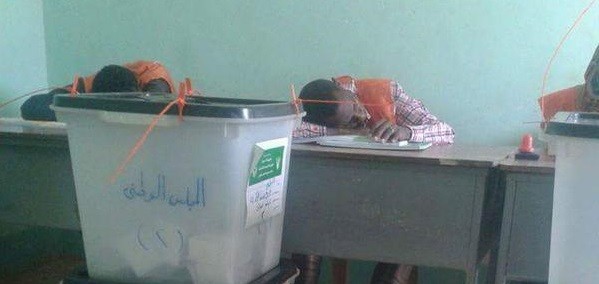Low voter turnout on the opening day of polls marred Sudan’s first general elections held since the secession of South Sudan in 2011.
13.6 million Sudanese citizens are eligible to vote for president, parliament, and state legislatures in more than 10,000 polling stations across the country’s 18 states. The voting began Monday morning and will run for three days. Results are to be announced 27 April.
President Omar al-Bashir, who is vying for the presidency after a quarter century in power, cast his vote at the Saint Francis School near the army’s general headquarters in the capital Khartoum. He was accompanied by his deputy Ibrahim Ghandour.
Though the government declared Monday an official holiday, Radio Tamazuj’s Khartoum correspondent in Hai El Nasr in Sharq Ennil area noted low voter turnout at Hai Kuku and Hai Huda, as well as other voting centers.
Only 15 people were seen lined up to vote at Wad El Sayeh center in Hajj Yusuf El Radmiya, where the ruling National Congress Party (NCP) and Democratic Unionists Party (DUP) – two of the parties seeking votes – erected tents over the polling station.
In Share Wahid polling center, only 30 to 35 voters were seen lining up to vote, while in Al Rahmaniyah Center at El Sahwa area in El Obeid town of North Kordofan, only 182 people cast ballots though 2780 were eligible.
One source said a bus carrying NCP supporters was going door to door in an attempt to get out the vote in the area. A large number of people interviewed by Radio Tamazuj in Khartoum said they did not know the locations of polling stations.
Still, a large turnout of voters was reported in Um Dafog area, which lies on the South Darfur-Central African Republic-Chad borders. Alit village in East Darfur also saw long queues, according to Osman Mohamed, head of the polling center there.
Election boycott
President al-Bashir is seen as the frontrunner in the election, though major opposition parties including the National Umma Party (NUP) led by al-Sadiq al-Mahdi, the Popular Congress Party led by Hassan al-Turabi, and the Sudanese Communist Party are boycotting the vote.
al-Bashir came to power through a coup d’état in 1989, supported by Islamists. He was re-elected in the 2010 election which was also boycotted by the opposition parties.
NUP’s Deputy Secretary of Youth Ali Abdullah Salem called on citizens not to participate in Monday’s elections.
The opposition parties are demanding the vote be postponed to allow for a comprehensive National Dialogue, which al-Bashir called for early last year.
A preparatory meeting for the National Dialogue was meant to take place this month, but the ruling party did not show up.
The conditions set for the political dialogue include the abolition of laws restricting freedoms and the formation of a transitional government to oversee the drafting of a permanent constitution and a fair election.
Rebels and representatives
Voting was suspended in seven constituencies in South Kordofan state, where rebels have vowed to block any polling.
The Chief-of-Staff of a rebel coalition called the Sudanese Revolutionary Front, Abdel-Aziz Al Hilu, recently announced a plan to sabotage the Sudanese elections.
Al Hilu, who is also deputy chairman of the SPLM-North rebel group, said in a press statement that the elections will not take place in South Kordofan. He ordered his forces to implement the order to stop the elections in the war torn region. The SPLM-N has battled the Sudanese Armed Forces since 2011.
About 1072 candidates are competing for the national parliament’s 425 seats, while more than 7,000 candidates are competing for the 235 seats in the state legislative assemblies.
The voters are using seven cards. The first is for the president, in which 15 candidates, mostly independents, are competing against al-Bashir.
The voting process also includes three cards for the parliament. The first is for geographical constituencies, the second is for a party list, and the third for women’s representatives, who account for 25% of the seats in the parliament according the Constitution.
Moreover, there are three identical cards for state legislative assemblies in 18 states.
On Monday, the first of three days of voting, polls are expected to stay open until 18:00 (15:00 GMT) in 14 States, while the voting will continue until 19:00 (16:00 GMT) in four other states where opened polls at 9:00 am.
Photo via Twitter
Want to comment on this story? Visit us on Facebook to join the discussion. Readers interested in sports are also invited to visit our Tamazuj Sports page for regular updates.




